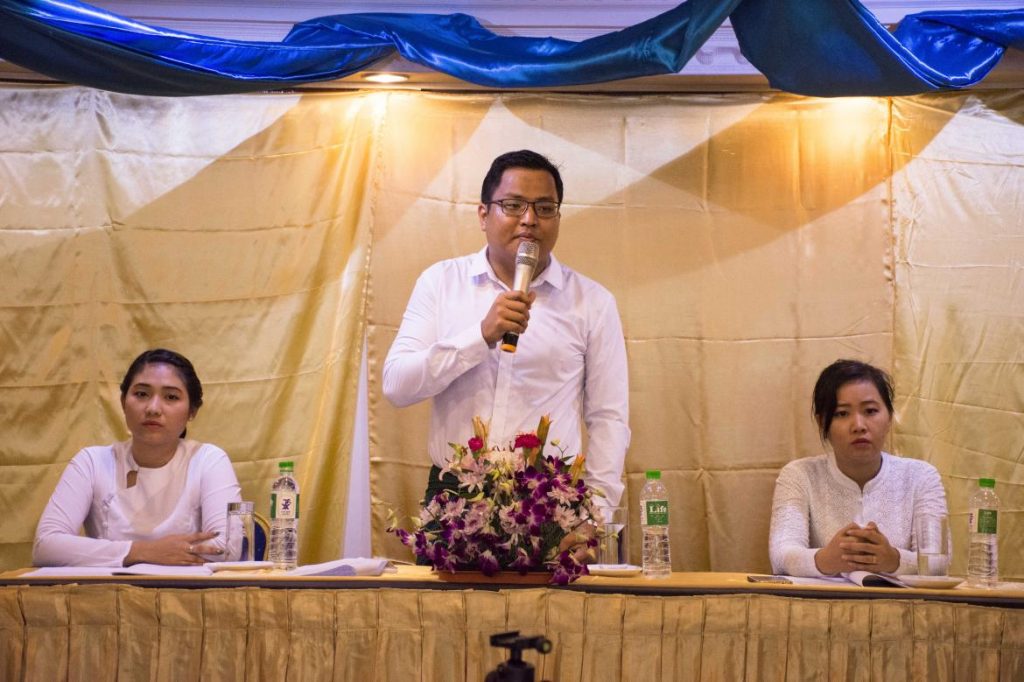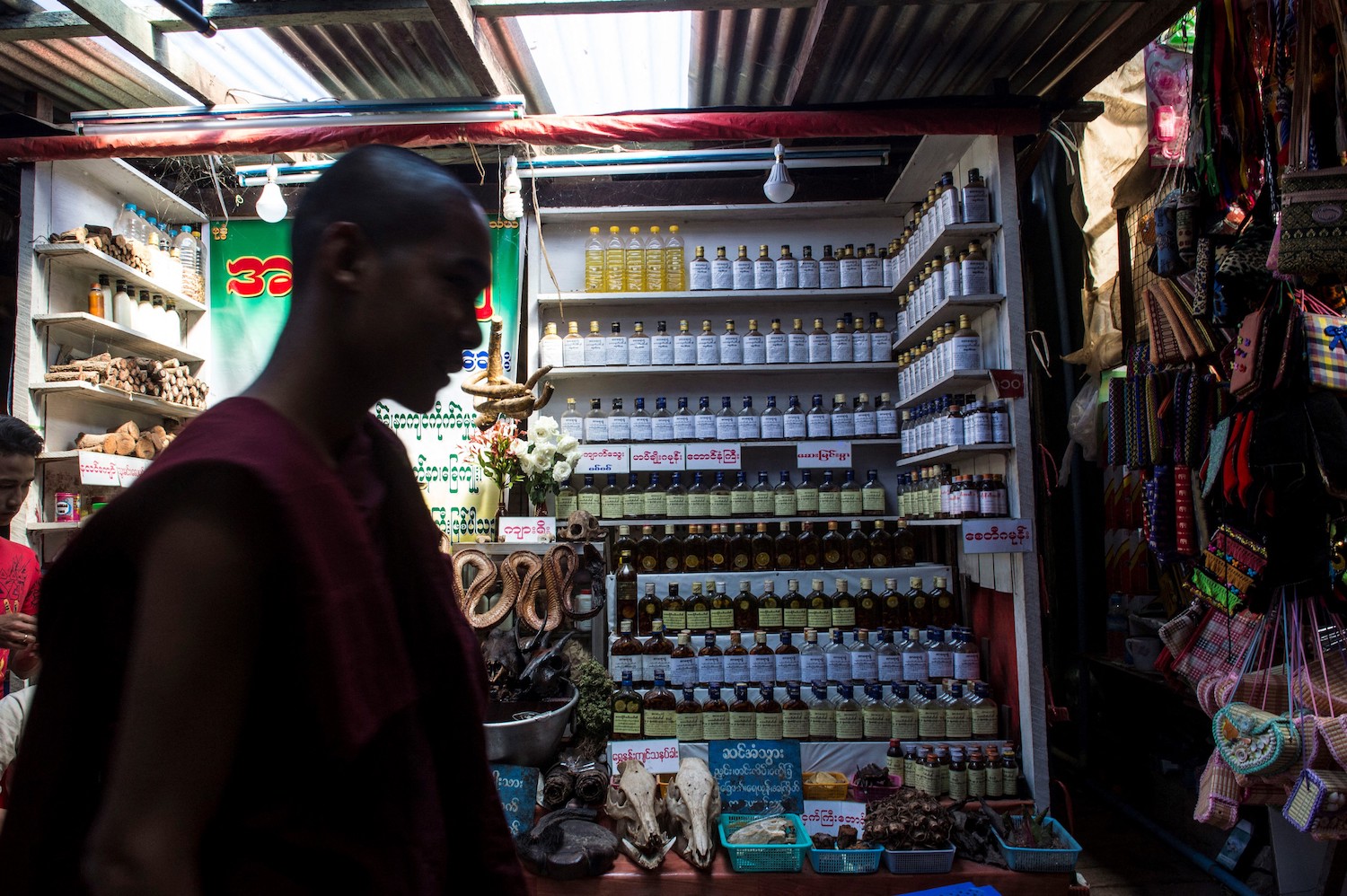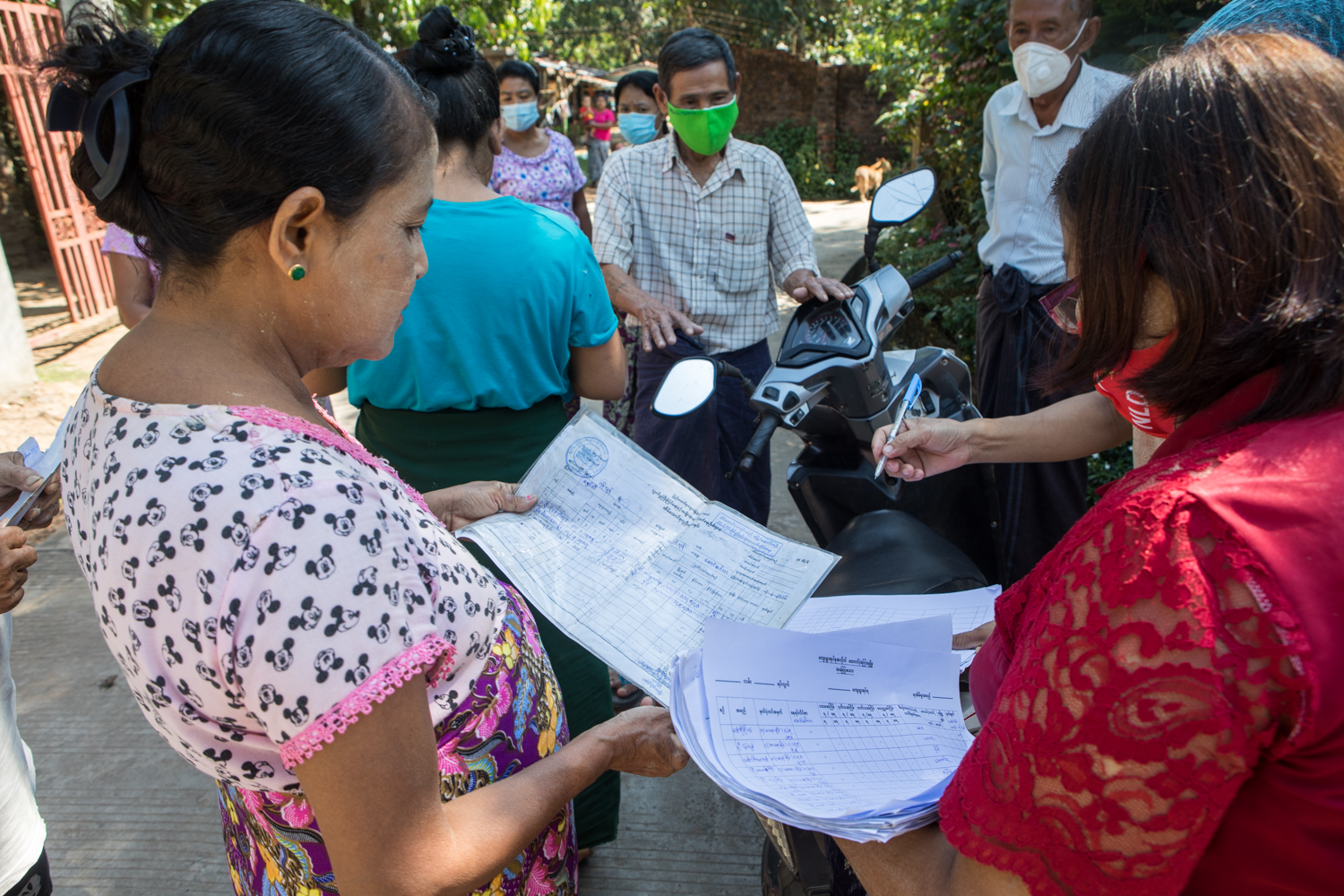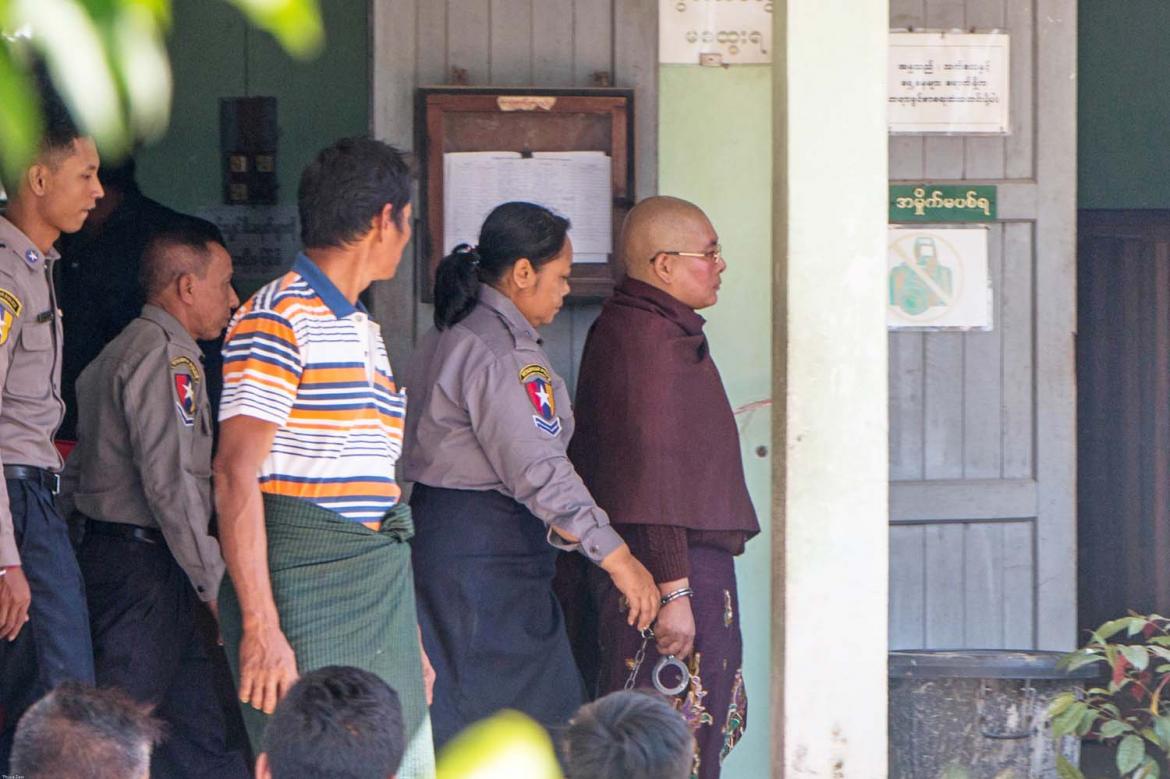Investment scams in Myanmar are ripping off unsuspecting – and sometimes suspecting – consumers, with the authorities seemingly unwilling to act.
By KYAW YE LYNN | FRONTIER
DAW CHO – not her real name – is well known in the multi-level marketing field, having worked in what she calls “network marketing” for more than a decade. But her latest venture is different. It requires only that investors click on a few links sent to them every 10 days, for which they will get a guaranteed return – and a very high return at that.
I Glob Ad claims to be one of the “largest mall media advertising companies worldwide”. Its promotional materials are comically amateur – they look like they were made using ’90s-era clip art. But its promised returns are eye catching: After investing US$12,750, “platinum” members will be paid a monthly return of $4,972.50 for clicking 16 links every 10 days. That’s a return of 39 percent a month, or 468 percent a year uncompounded.
The company was registered in the UK in September 2016 to a person named “Mackenzie Carter”. For someone who claims to be a world leader in marketing, it’s surprising that Mackenzie Carter seems to have no web or social media presence.
It’s not clear who is really behind I Glob Ad, but in May a person named Rafał Zajączkowski posted a video, “Welcome Byrma in I Glob Ad”, to YouTube in which he introduced himself to Myanmar investors as “your upline from Europe”. (Zajączkowski did not respond to a request for comment.)
Support more independent journalism like this. Sign up to be a Frontier member.
I Glob Ad is almost certainly a scam – the outrageously high, guaranteed return gives it away. But another “red flag” that often distinguishes a scam from a legitimate multi-level marketing firm is the promise of high earnings for little or no effort.
As Daw Cho explains, though, that’s precisely the attraction. Unlike traditional multi-level marketing, it’s seen as easy money.
“People don’t like MLMs as it forces them to buy and sell products,” she told Frontier earlier this month.
Daw Cho is what’s referred to as an upline, leader or agent: she receives a commission for recruiting people into the scheme. She’s aware that if I Glob Ad collapses she could face legal action from those she’s encouraged to invest. She even admits that it probably is a scam.
“I let my friends know that there is a risk of losing money if you follow me,” she said. “It’s a kind of gambling. You need to take a calculated risk.”
When Frontier called I Glob Ad’s Myanmar office on September 18, a man named U Aung Myo Thwin answered the phone. He described himself as an “investor” and said he didn’t know whether the company had a media spokesperson.
“I know there is a risk of losing our money. But I’m still getting returns on my investment, which is around K10 million,” he said.
“No one will take responsibility for any potential loss [of money]. The agents made that clear when they introduced us [to I Glob Ad].”
Second coming
The I Glob Ad “business model” – clicks for money – is hardly new in Myanmar. When Ma Ei Cho Zin Tun heard in December 2014 that an online advertising company was promising investors returns as high as 35 percent a month for clicking on a few links, she was deeply skeptical.
“At first, I suspected it was some sort of scam,” recalled the 28-year-old resident of Yangon’s Yankin Township.
The company was called Silicon Technologies Myanmar Limited. The company claimed to be registered with the Directorate of Investment and Company Administration (Frontier could find no record of the company in DICA’s registry). At the time it was publishing advertisements in state-run newspapers seeking agents in cities and towns across Myanmar. It promised these agents a high commission for recruiting new investors.
“I noticed the advertisement was on the newspaper for several consecutive days,” said Ei Cho Zin Tun.
Despite her misgivings, she decided to invest after discussing the company with a friend, who said he had invested about a year earlier and was enjoying unusually high returns.
After investing K3 million at the end of 2014, all she had to do was open emails sent by the company around twice a week, click on the links and hit a “like” button. It took only a few minutes at a time. Within three months, she’d made back her initial investment.
“I thought making money is so easy,” she said. “So I put in more money … I even told my sister to invest in the company.”
But after she increased her investment in February 2015, the returns from Silicon Technology Myanmar dried up.
I was working for Popular News at the time. In January 2015 I heard about the scam and visited the company’s office in Kyauktada Township. The owner, an Indian named Mr Bimalraj, refused to meet me, but later agreed to be interviewed. He claimed his company was registered in Myanmar and showed what appeared to be incorporation documents from the Directorate of Investment of Company Administration. However, the DICA registry has no record of a company named “Silicon Technology Myanmar”.
I wrote an article that month warning the public that the company was probably a scam, and informed the authorities about Silicon Technology Myanmar in an attempt to prevent any further losses.
Shortly afterward, the company disappeared. Ei Cho Zin Tun said she realised she lost her investment when she Silicon Technology Myanmar’s office had closed.
Thousands of people – including the company-approved agents who had been recruited through state newspapers – lost billions of kyat. Although they opened a criminal case against the company, the owner had long fled the country.
Wave after wave
Ponzi and pyramid schemes have been a regular occurrence in Myanmar for decades. Yet people continue to fall prey to scammers for a range of reasons, including lack of knowledge, greed and regulatory weaknesses.
Such schemes take many forms. In 2015, Global Growth Company Limited based in Sakura Tower billed itself as a futures trading company, inviting customers to deposit money and trade contracts for commodities. It also reportedly offered a Global Group Investment Program under which “foreign experts” would trade clients’ money. High commissions were offered to encourage people to sign up.
Not surprisingly, it soon disappeared, leaving around 300 people out of pocket K1.5 billion. It later emerged that one of its partners was a Hong Kong businessman named Mr Ng Kwok Fai, who had allegedly perpetrated a similar scam in Vietnam in 2008.
Police refused to accept a criminal case against Global Growth’s local directors, saying it was “irrelevant” because Ng had already fled.
More recently, the authorities failed to stop a scam known as Saxon Capital Limited, which offered implausibly high returns on “shares”. Like Silicon Technology Myanmar, it employed a decentralised sales system using “leaders” in regional and rural areas who received a commission based on shares sold.
When the perpetrators disappeared, a person associated with SCL launched I-Smart Golden Myanmar. It, too, has been accused of cheating investors; altogether, billions of kyat are believed to have been bilked, mostly in rural areas. No arrests have so far been announced.
“We have seen a wave of such Ponzi schemes over the decades,” former deputy minister for finance U Maung Maung Thein told Frontier in a recent interview.
He said the first wave came in the early 2000s, when companies such as Ayeyar Myay, Htoo Char and Arrow promised high returns but soon collapsed, contributing to the 2003 banking crisis.
“Since them, several foreign Ponzi schemes have taken advantage of loose rules and regulations,” Maung Maung Thein said.
jtms-ummthein-02.jpg
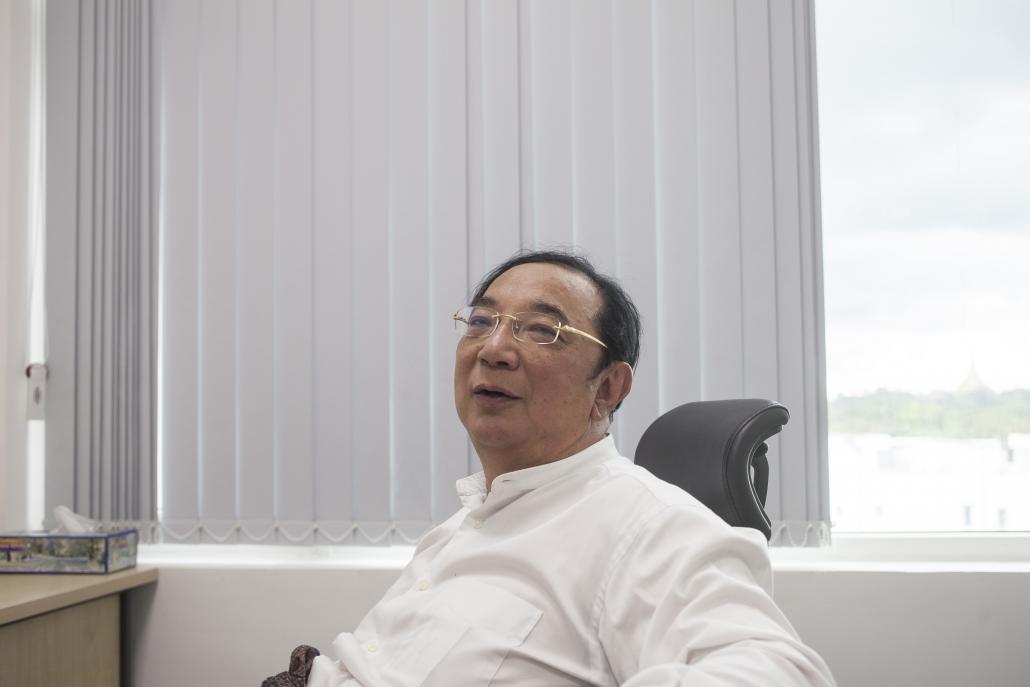
Former Deputy Minister for Finance U Maung Maung Thein says the U Thein Sein government was too busy to tackle investment scams. (Theint Mon Soe aka J | Frontier)
He said the Central Bank of Myanmar’s Financial Institutions Regulation and Anti-Money Laundering Department needed to increase its surveillance activities so it could detect scams before people are fleeced.
“If the regulator is not pro-active, Myanmar people will keep getting ripped off by Ponzi schemes,” he said.
Yet when he was deputy minister and concurrently chairman of the Securities and Exchange Commission of Myanmar, Maung Maung Thein seemingly did little to tackle Ponzi schemes and other investment scams.
Interviewed about Global Growth in December 2015, he told Frontier: “The people who were cheated by the company are not poor people … Obviously, if they can invest a lot of money, they must be rich, so it is not problem for them.”
Speaking again earlier this month, he admitted that he could have done more. “We were very busy at that time and didn’t pay much attention to scams.”
A welcome step
It seems the authorities are finally waking up. The Ministry of Home Affairs announced on September 11 that it had formed a commission, led by its financial crime-fighting body, the Bureau of Special Investigation, to investigate multi-level marketing firms.
The statement said the commission also includes representatives of the departments of commerce, revenue, and food and drug administration, as well as DICA.
It added that three local and foreign MLM firms were blacklisted in 2009 and 2011 under the 1950 Emergency Provisions Act.
“As the act was abolished in 2016, a new law is needed to regulate MLM firms,” it said.
While multi-level marketing is controversial, most MLM companies are still legitimate businesses. Typically, members earn money by selling consumer products but are also encouraged to recruit others to sell the same products, too. This workforce is known as a “down line”; the recruiter receives a percentage of the sales.
However, because they share many features with pyramid or Ponzi schemes, it’s easy for outright scams to market themselves as an MLM.
Multi-level marketing firms are responding to the government probe by banding together in an effort to protect their name. One industry source, who asked not to be named because he was not authorised to speak to the media, said legitimate MLM firms have formed a working committee to form a Direct Selling Association of Myanmar. It has already held two seminars with the government to discuss the plan.
“Like Malaysia and Singapore, Myanmar should have an association to oversee direct selling companies,” said the manager at Creative Network International (Myanmar), a subsidiary of a Malaysian multi-level marketing firm.
He added multi-level marketing companies needed to work more closely with the government to prevent further scams.
“There are more than 60 MLM firms in Myanmar but some are not MLMs – just scams,” he said.
Myanmar Junwell
But the veracity of the BSI-led investigation is already being questioned after four Chinese Malaysians allegedly ran off on September 3 with US$1.5 million invested in Myanmar Junwell Global Co, Ltd. Three of the men have been named as Loh Yun Poh, Wong Jyh Huei and Darren Lee Sin Loong; the fourth has only been identified as “Adam”.
The company was registered with DICA in September 2015 and has two directors: Daw Nwe Nwe Aung and Daw Wint Wah Phyu. Another company, J-Card Business Co, Ltd, was set up in June of this year.
Junwell initially acted as a forex and commodities broker, giving clients the option of trading themselves or allowing the company to trade on their behalf.
Former managing director U Kyaw Swar Hein said at a press conference on September 15 that he had never seen Nwe Nwe Aung and Wint Wah Phyu and the business was really run by the Malaysians.
In late 2016, the BSI-led committee investigated Myanmar Junwell. The company stopped offering forex trading, but was allowed it to continue operating. In March of this year it launched a mobile app called J-Coins.
J-Coins allowed users to open an account into which they could deposit money. They then received heavy discounts if they made purchases at participating businesses, and a commission if they referred a new user.
Kyaw Swar Hein was working as an administrative officer at the time of the BSI investigation. Once it concluded, he was offered the MD position with a monthly salary of US$1,000.
He accepted the post after he was taken to visit the company’s headquarters in Jakarta, where it operates under the name JW Futures.
However, he said he quit on June 17 after the Malaysian owners cut his salary and he stopped receiving a return on his K12 million investment.
“They only paid me the full salary for three months, then reduced it to $350 a month,” he said. “I also haven’t been able to get my investment back.”
He has hired a lawyer to investigate whether he can take legal action against the company’s real owners.
Junwell was associated with several branded businesses, including J-Restaurant and J-Mart.
But the restaurant’s managing director, U Kyaw Zin Min Htet, said he was not in partnership with Junwell or J-Card. He told Frontier he only named it J-Restaurant because he was told it would attract J-Card users.
He claimed he also lost money in Junwell, but refused to give details.
However, U Zaw Lin Myat, a J-Card Business director, said the restaurant was a partnership between the Junwell owners and three people, including Kyaw Zin Min Htet.
“As the restaurant was not doing well, the company negotiated to sell it to its partners for K10 million,” he said. “But given the owners have fled the country there’s no way we can demand that much money.”
Like Kyaw Swar Hein, Zaw Lin Myat said he was appointed by the Malaysian owners to act as managing director.
“Honestly, though, I am just a staff member. My salary is $500 per month,” he said. “Most of the victims are staff and their families.”
He said the company was selling its assets in an attempt to pay back creditors, including a nominal amount to the 4,000 J-Card users.
“The Malaysian owners withdrew all the money,” he said. “We are selling items at J-Mart to pay our electricity bills.”
Questra: new scam on the block
On September 15, a group of MLM leaders gathered in an apartment in Yangon’s South Okalapa Township. A woman named Daw Nang Htwe Kham introduced them to an investment scheme named Questra World that promises a return of at least 4 percent per week. Questra, which is supposedly headquartered in Spain, is offered by Atlantic Global Asset Management, a company registered in Cape Verde.
Although Questra World doesn’t have an office in Myanmar, more than 1 million euros have apparently already been invested by people here.
Nang Htwe Kham is what’s known as a “bronze director” – a title attained by attracting 500,000 euros of investment. She claims she’s reached this mark in just two months, and has even invested 100,000 euros of her own money.
“If you look at the company, you will see how strong its background is,” she told attendees.
questra-ad.jpg

A promotional ad for Questra World posted on a Facebook page created for investors in Myanmar.
According to her PowerPoint presentation, the company has 25 professional fund managers who invest clients’ money.
“We don’t need to trade ourselves. The fund managers do it instead, and we get the profit regularly,” she said.
Asked about the public warning that Belgium’s Financial Service and Market Authority issued concerning Questra World on July 18, Daw Nang Htwe Kham said it was because Questra wasn’t registered in Europe and therefore was technically illegal.
“[Regulators] want to ban Questra World as they don’t want their money to flow out of the country,” she said. “Then many warnings like this one emerge, saying that Questra World is a scam – blah blah blah.”
She claimed that Questra World had bought a European bank in August – she couldn’t say which one – and had used it to set up a new company called Five Wings Asset Management that could offer investments legally in Europe.
Of course, Questra is nothing but a Ponzi that will eventually collapse. Those who put money in cannot withdraw their principal for at least 52 weeks – a moot point given they’ll never see it again. Questra World is apparently run by a group of Russians and Eastern Europeans with a long track record of scams. It has no source of income other than investment from new members. Once that dries up it will collapse.
In fact, it stopped paying many investors in Europe back in July. It’s not like they weren’t warned: regulators across Europe, including Austria, Britain, Liechtenstein, Belgium, Italy, Slovakia, Hungary and Poland, have advised against investing in Questra World.
The rebadging as Five Winds Asset Management is simply an effort to lure in more unsuspecting investors.
Why would a Ponzi that has already stopped paying in some countries still be able to find new customers in others? Because those who get in early can still make a profit off commissions by recruiting new members. These commissions range from 5 to 15 percent; as a bronze director, Nang Htwe Kham would receive 13 percent of whatever investments she can attract.
In a 2012 study, “The Postmodern Ponzi Scheme: Empirical Analysis of High-Yield Investment Programs”, researchers from the University of Cambridge and Wellesley College in the United States examined websites that aggregate data on so-called high yield investment programmes – that is, online Ponzi schemes – for nine months. The authors argued that many investors knew they were investing in Ponzi scheme but were taking – as Daw Cho put it – a calculated risk.
“We call them ‘postmodern’ Ponzi schemes because we believe that many of the investors are well aware of the fraudulent nature of the sites, but are of the opinion that by investing at an early stage – and withdrawing their money before the scheme’s collapse – they will be able to make a profit at the expense of less savvy investors,” they wrote.
The September 15 Questra meeting was held at the I Glob Ad office. Some I Glob Ad leaders – those who sought new investors and received a commission for doing so – said they were considering abandoning the scheme as they foresaw an “uncertain future” for it.
Among the attendees was Daw Cho, who said she had already withdrawn her money from I Glob Ad and invested in Questra.
“I’m not sure if [I Glob Ad] is a scam, but it seems risky because we’ve seen similar businesses disappear before,” she told Frontier. “So instead I’ve invested in Questra World, which has an impressive background.”
TOP PHOTO: U Kyaw Swar Hein, centre, former managing director of Myanmar Junwell Global Co, Ltd, speaks at a press conference in Yangon on September 15. (Theint Mon Soe aka J | Frontier)


